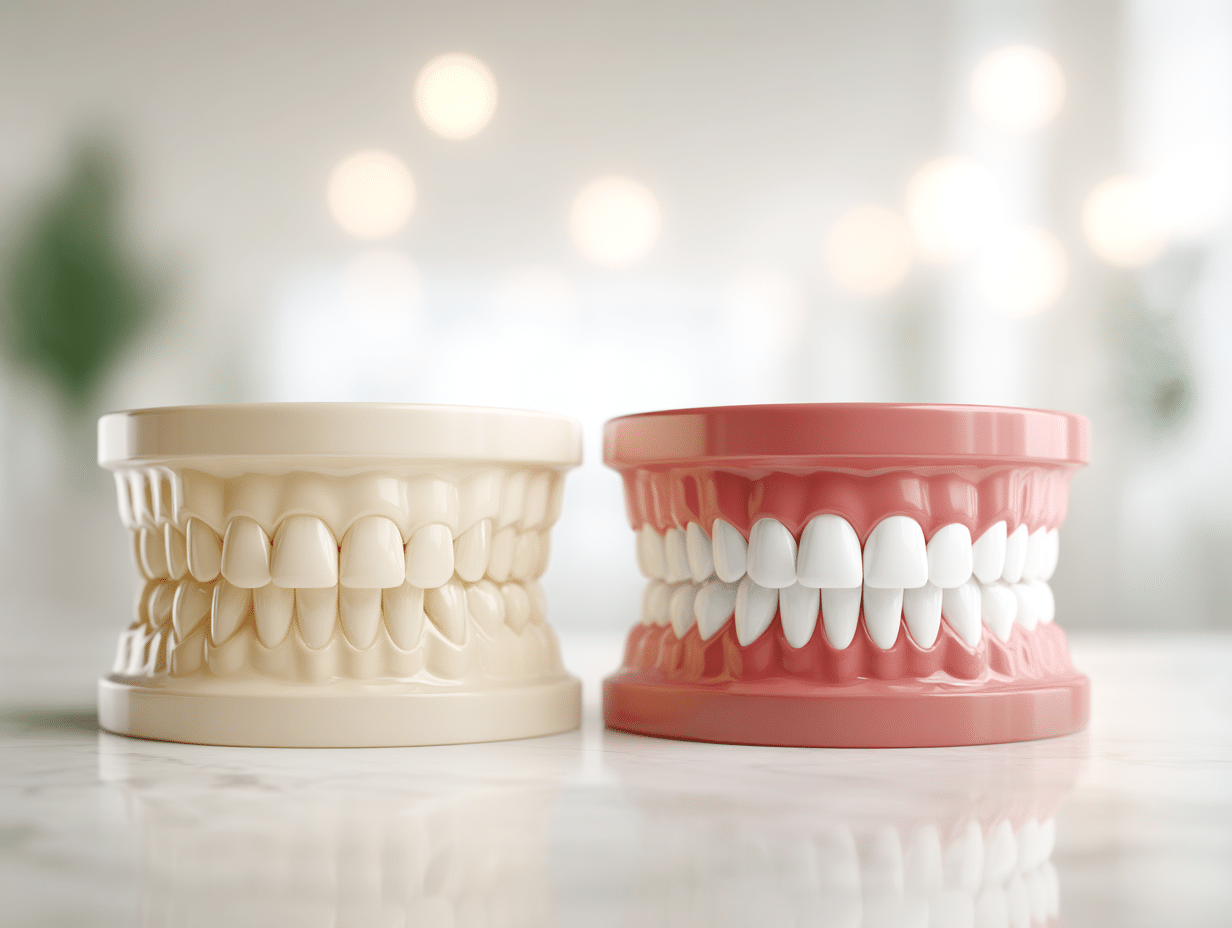Those who want a better smile have choices today. Two choices are composite bonding or veneers. As a dentist, I can vouch that both are exceptional in creating a lasting smile. The option you choose depends on the extent of your smile issues, your age, and long-term goals.
Types of Dental Issues for Correction
Dental issues are individualized and everyone can have a variety of them. It’s important to understand what can be corrected with composite bonding or veneers. It’s also critical to ensure that oral health issues get corrected first before you attempt to correct aesthetic issues.
⚠️ Important:
Oral health issues can’t be corrected with either of these procedures. Cavities, infections, and misaligned teeth need other forms of dental treatment like fillings, root canals, or orthodontics. It’s important to get your mouth healthy before you consider composite bonding or veneers.
While composite bonding and veneers are considered cosmetic procedures, they do help strengthen teeth and give them more functionality. Those with weak teeth that easily chip, break, or fracture would do well to look at these two options to improve overall oral health and chewing function.
What is Composite Bonding?
Composite bonding is correcting a tooth chip or crack by adhering a composite material to your tooth. The material is typically a combination of resin and porcelain. It looks just like your natural tooth and is adhered to the damaged area, smoothed, and polished.
Composite bonding is a great way to fix chipped, cracked teeth without installing a crown. They can be used to fill gaps between teeth, make teeth appear more even, and cover discoloured or heavily damaged teeth.
The Procedure
The procedure starts with the dentist etching or roughing up your natural tooth so the composite substance sticks to it. They put the substance on with a type of dental cement, shape it, and cure it with heat so it stays. The final step is to finish the shaping and polish it.
Composite bonds look, feel, and function like natural teeth. They can last well over 10 years with proper care. They don’t have the sensitivity of a natural tooth and that can take some adjustment. Your tooth doesn’t feel your tongue rubbing up against it. However, that can be a positive thing if your damaged tooth has been highly sensitive.
Composite bonded teeth function as well as natural teeth. Those on the front can be used to eat an ear of corn. Those on the back can chew steak.
One of the biggest benefits of getting composite bonded teeth is you can add them to your teeth one at a time, as needed. You don’t have to put a lot of investment into it because composite bonding is one of the most affordable procedures at a dental office. They are easily replaced if they fail too.
All About Veneers
Veneers are popular with older people who have several dental issues occurring. They can cover damaged and discoloured teeth with a bright, white, even smile.
Veneers are a shell that fits over the front of teeth. They are only attached to the front so the backside of teeth remain natural. Veneers are used cosmetically to present perfectly even, uniform teeth. They hide discoloration, make short teeth appear longer, and cover severely damaged teeth. They can fix gaps and other imperfections.
This option is also used by those who have weaker teeth and have lost tooth function because of weakness. It is also used to address worn-down teeth that can lose both appearance and function. These are common problems among older people, which is why they like the veneer option.
Veneers can be installed on one or two teeth or you can get both rows of teeth done.
Veneer Installation Process
Veneer installation is much the same as composite bonding. You will have a consultation, X-ray, and exam. The teeth will be prepped by the dentist removing some enamel from the front of your teeth, roughing them. This is important for proper adhesion but also to allow for room for the veneers. This promotes a natural appearance.
The dentist or assistant will administer a local anesthetic so numb the area. An impression will be made of your teeth to create a customized set of veneers that fit your teeth and look.
A customized set of veneers may take a few days or a couple of weeks to build, so the dentist may install temporary veneers to wear while you wait for your next appointment. Once you have your permanent veneers, the dentist will start the bonding process.
This part of the process starts with a bonding adhesive applied to the veneers. A curing light will harden them once they are placed on your teeth. The dentist will make some adjustments to ensure they fit correctly and look natural.
Veneers can last decades and are meant to be a permanent fixture. They give you full teeth function, although it may take time to get used to them.
Temporary Veneers
Younger people with damaged teeth are experimenting with veneers by buying temporary clip-on versions. They can be inserted or taken out in seconds and allow people to see what they would look like with veneers. Yet, they are cheaper and a non-committal option. Temporary veneers are a good way to explore the idea when you aren’t certain.
Cost
💚 Composite Bonding
$970 – $3,465 CAD per tooth
Includes everything in the procedure and materials. Most affordable option for smile enhancement.
👑 Veneers
Porcelain: $970 – $3,465 CAD per tooth
Composite: $313 – $2,079 CAD per tooth
Full set: $7,475 – $27,700+ CAD
Premium smile transformation
Cases are Unique
These are standard prices and information. Every patient is unique so the procedure and price can differ between patients. Talk to us about your dental goals and let us guide you toward achieving them. We are here to improve your function and your smile!
Frequently Asked Questions
Ready for Your Smile Transformation?
Contact Smile by Design Dental to discuss which option is best for your unique smile goals.




